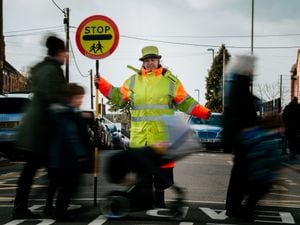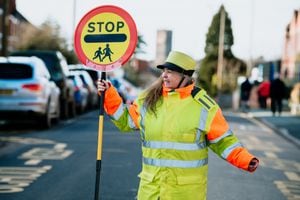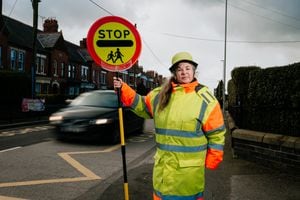Crossing patrol: The rise and fall of lollipop men and women
For generations they have been a friendly face helping schoolchildren to cross the road safely.

With their luminous jackets and giant ‘lollipops’ crossing patrol wardens are a welcome sight outside many of the region’s primary schools.
In recent years, however, they have become rarer in some parts of the country as numbers have fallen as councils look to save cash.
Nationally there are around 2,000 fewer lollipop men and women, as they are fondly known, compared with a decade ago.
But in Shropshire and Mid Wales hundreds are still on duty every week day helping pupils and their families cross busy roads.
History
It’s a role that has a long history as the first lollipop lady was Mary Hunt, a school caretaker who began work helping pupils in Bath get to lessons on September 21, 1937.
The outbreak of the Second World War put paid to a nationwide scheme so it wasn’t until the early 1950s when patrols were more widely adopted.
Two of Britain’s first road safety officers – Dorothy Pummell in Barking and Jock Brining in Dagenham – began recruiting ‘active retired gentlemen’ to help school children cross the road, issuing the men with a lollipop, white coats, yellow armbands, and peaked caps.

Other boroughs followed suit and the patrols were recognised officially with the introduction of The School Crossing Patrol Service as part of The London Traffic (Children Crossing Traffic Notices) Law of 1952.
The Act allowed any person authorised by the Commissioner of the Metropolitan Police, using the prescribed traffic sign, to stop traffic in order to allow children to cross. Traffic had to stop before reaching the patrol or be fined £5. The 1953 School Crossing Patrol Act extended the idea nationally. Since then patrols have been granted the right to stop traffic and to escort adult pedestrians across the road as well as children.
The first stop signs on a pole were black-and-white rectangles; the round sign, immediately dubbed the lollipop, was introduced in the 1960s.
In 2000, a change in law meant crossing patrols were no longer a legal requirement for schools, which led to a reduction in numbers nationally.
According to the latest figures issued by the GMB union, there were 7,128 employed by councils across England, Scotland and Wales in 2009/10 and by 2017/18 that had dropped to 5,047. The West Midlands and the North West were the worst-hit regions, with drops of 386 and 378 respectively, while Wales had 250 fewer school crossing patrol officers, with Scotland losing 163
But for the men and women who still carry out this important role each week it’ remains a rewarding job.
Fun
In Shropshire there is a small but dedicated team of crossing patrol wardens who, come rain, hail or snow, help children and families get to and from school in safety.
Mother of two Wendy Parkes has been on duty in Station Road, Whitchurch for almost 20 years. She applied for the role when she was looking to go back to work after having her children having previously worked in a school.
“I thought I would just do it for a couple of years and then move on. But I’m still here now,” says Wendy, who is in her late 50s.

She says it’s the children she meets that make being a lollipop lady such as enjoyable job. “They kids are great. They tell you everything, they’re like open books. It’s a lot of fun,” says Wendy, who lives a short walk away from her post.
The good old British weather can make it a challenge at times but Wendy says she enjoys being outside in the fresh air.
“The weather can get you down a bit when it’s cold or it’s throwing it down with rain but you’ve got to remember why you’re there and get on with it.
“Time runs away with you and before you know it it’s the end of the school year,” she says.
Wendy helps pupils at the start and end of the school day and estimates that she will have walked a mile and a half by the time she has finished her two shifts.
Teaching children – and quite often their parents – about road safety is an important part of the job.
“If I see parents not crossing in a safe place I will tell them they are not teaching their children about road safety. The children like it when I tell the parents off,” says Wendy.
School crossing patrols are highly regarded by schools and parents and this was demonstrated in Staffordshire just last year.
The county council was proposing cutting funding for lollipop patrols in some areas as part of its upcoming budget
However, following a backlash from parents, including a petition signed by more than 7,000 people, council bosses decided to carry on providing the service.





